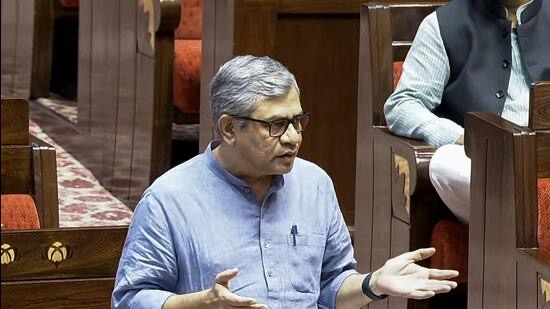He defended the amendment to the Information Technology (Intermediary Guidelines and Digital Media Ethics Code) Rules, empowering the government to notify a fact check unit. IT and information and broadcasting minister Ashwini Vaishnaw reiterated the government’s stance that the government itself is best positioned to fact check misleading and false information about itself when questioned about the Press Information Bureau’s controversial fact check unit in the Rajya Sabha on Friday. Trinamool Congress’s Dola Sen asked the government if it was true that the Supreme Court and the Bombay High Court had stayed the creation of the PIB fact check unit this year. As the minister of state for I&B L. Murugan was replying, Vaishnaw interrupted and defended the 2023 amendment to the Information Technology (Intermediary Guidelines and Digital Media Ethics Code) Rules, 2021, that empowers the central government to notify a fact check unit to identify any fake, false or misleading message or information about the business of the central government. “… the point is fact check related to the government of India, all the ministries, all the departments of the government of India, who is the right authority to say whether a data or an information related to a particular ministry or a particular department should not be given by anybody other than the ministry or department. That is the fundamental point under contention. The amendment under the IT Intermediary Rules which has been stayed by the honourable Supreme Court is still under contest but the fundamental principle is, our point is that anything related to the government of India, only the government of India can say whether it is a correct fact or a wrong fact. That’s our stand,” Vaishnaw said. PIB Fact Check Unit’s creation was announced by PIB in a tweet on 29 November 2019. The Supreme Court order dated March 21 has not stayed its creation. The order only stayed its notification as the fact check unit for the purposes of fact-checking all online content related to the business of the central government after the government released such a gazette notification on March 20. “[W]e are clearly of the view that the notification dated 20 March 2024 which has been issued by the Union Government after the rejection of the application for interim relief would need to be stayed. … the challenges to the validity of Rule 3(1)(b) (v) involve serious constitutional questions. The impact of Rule 3(1)(b)(v) on the fundamental right to the freedom of speech and expression would fall for analysis by the High Court. We accordingly set aside the opinion of the third Judge dated 11 March 2024 declining interim relief and direct that pending the disposal of the proceedings before the High Court, the notification of the Union Government in the Ministry of Electronics and Information Technology dated 20 March 2024 shall remain stayed,” the March 21 order by chief justice DY Chandrachud, and justices JB Pardiwala and Manoj Misra read.
Trending
- Republic Day parade seating row returns as Congress flags Rahul Gandhi, Kharge’s seats: ‘Lack of protocol’.
- Relations for 10 years, then a promise broken: Dhurandhar actor arrested on sex assault charges by domestic worker.
- Zoho founder attacks Congress over ‘gomutra’ dig at IIT prof who got Padma Shri.
- India-EU trade deal finalised, says commerce secy; to take effect next year.
- ‘Financing war against themselves, via Russian oil’: US secy Scott Bessent ballistic over EU’s trade deal with India.
- Ex-IPS Inderjit Sidhu, 88, on a mission to clean his city’s streets by himself, gets Padma Shri.
- Argument while getting off local train, then a stabbing: Mumbai professor’s shocking murder at Malad station.
- Mark Tully passes away at 90: BBC’s ‘voice of India’ reported from Amritsar to Ayodhya, key moments of history.



